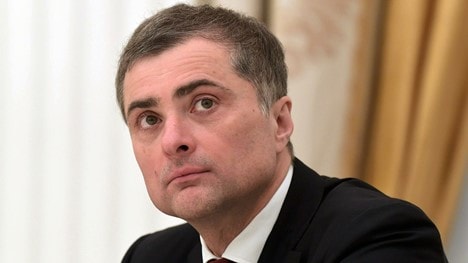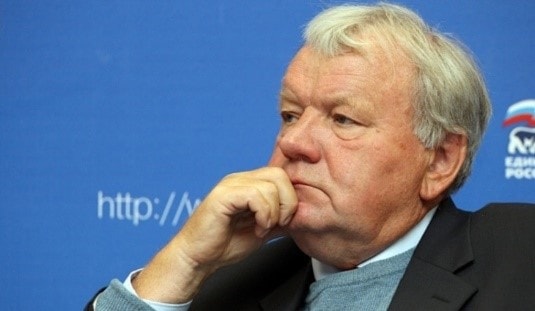The current tension between Russia and Ukraine is playing out together with the thirtieth anniversary of the Soviet Union's collapse, an event that Vladimir Putin calls a tragedy. Many in Russia view the passing of the empire and the attendant territorial losses as the product of treachery. Some, such as former Putin aide Vladislav Surkov, who was a patron of the militias in the breakaway Donetsk and Luhansk regions of Ukraine view the loss as temporary. In an article that he wrote in November Surkov argued that imperialism was part of Russia's DNA and an effective means for securing unity at home: "For Russia, constant expansion is not just an idea, but a true existential potential of our historical existence.
"Imperial technologies are still effective today, when empires have been renamed 'superpowers.' The Crimean consensus was a vivid example of the unification of the [Russian] society at the expense of the chaotization of a neighboring country [Ukraine]. Brussels's and Washington's complaints about Moscow's interference and the impossibility of resolving serious conflicts around the globe without Russia's involvement demonstrate that our state has not lost its imperial instincts." Surkov predicted that Russia will shortly "In the meantime, the world enjoys its multi-polarity, a parade of post-Soviet nationalisms and sovereignties. But in the next historical cycle, the now forgotten globalization and internationalization will come back, to overtake this twilight multi-polarity. And Russia will get its share of the new worldwide gathering of lands (or rather, of spaces), confirming its status as one of the few globalizing powers, as it was in the times of the Third Rome [the author refers to Ivan III correspondence] or the Third International.
"Russia will expand, not because it is good or bad, but because physics demands it."[1]

Vladislav Surkov (Source: Ria.ru)
The political scientist and social philosopher Alexander Tsipko, who worked on political programs for the Gorbachev Foundation acknowledges that ideas such as Surkov's have deep historical roots. He argues that the collapse of the Soviet Union represented fatigue with the Soviet command economy and the burdens of empire. Tsipko rejects the idea that the Russian people view a life of sacrifice and suffering to sustain Russia's expansion as a form of paradise. The Russian people have already paid a heavy price for the annexation of Crimea and the support of the separatist regions in Ukraine. This is but a foretaste of what will happen should Russia attempt to annex additional territories from Ukraine.
Tsipko's analysis follows below:[2]

Alexander Tsipkov (Source: Mirnov.ru)
"At the end of December 1991, the USSR officially ceased to exist. It is commonly believed that the true meaning of great upheavals is revealed centuries later. But this idea is a beautiful self-deception for people who fear the truth about their history. As the participants and creators of great historical events die, the truth about the history dies with them. Thank God, we are lucky, because many actors and witnesses to the events of 1991 are still alive. But the paradox is that the USSR's political and intellectual elite is in no hurry to share with us their reflections about the reasons for the death of of Lenin and Trotsky's brainchild, which lasted for more than 70 years. In my opinion, the reason for this is both their unwillingness to tell about their own responsibility for the collapse of the USSR and, most importantly, their unwillingness to admit that the principal architect of this collapse was the people.
SUPPORT OUR WORK

"The truth about national history, about the reasons of national disasters depends not on temporary distance from the events that occurred, but on the moral, intellectual, spiritual health of the ruling elite. For those, who believe that the purpose of Russian history is the expansion of Russia's borders it is scary to admit that the country irrevocably died as an empire in 1991. It is scary for them to admit that, actually, the Russian people don't suffer from some 'imperial syndrome' and that they are utterly tired of this empire.
"The modern-day patriots, who argue that the USSR, as a great power, could've survived, if not for the 'traitor Gorbachev,' do not know that back in early 1918 Nikolai Berdyaev wrote an article titled 'Russia and Great Russia,' dedicated to criticizing what Yeltsin called the 'sovereignty of the RSFSR' seven decades later.
"Berdyaev believed that Russians have no right to separatism, that they are obliged to sacrifice themselves and their affluence in order to preserve the Great Russia, because ' suffering is a necessary internal characteristic of the Russian idea' and, therefore 'it was preferable that a suffering, large and maladjusted Russia should exist, as opposed to the comfortable and complacent states of Great Russia, Little Russia, Belarus and other lands, who imagined themselves as independent entities. And the paradox is that the patriot Berdyaev's enemies, namely the Bolsheviks, saved Russia from 'Great Russian separatism' and once again transformed the Russians into the perpetually suffering state-forming ethnos of the Soviet empire.
"Seventy years of Soviet history have passed, and once again the Russians' empire fatigue has resurfaced, once again the ever-indigent and impoverished Russians said that we were tired of providing for the Caucasus, the Baltic countries, and the Ukraine. This time, the empire fatigue coincided with fatigue from the Soviet mobilization economy, which could do everything except for creating the main thing on which life itself depends: 'daily bread' and what is necessary for a comfortable living. The USSR, which possessed half the world's black earth lands, was unable to produce enough grain to make bread and forage for the livestock.
"Personally, I'm less concerned today about the reasons for the USSR's collapse (the answer is rather obvious). Far more important is the question of why the political elite of today's Russia doesn't want to see the truth about what we call 'the USSR's great power status,' to see that in many respects Soviet Russia was just as backward a country as tsarist Russia. The inability to renounce the myth of Russian great power status (i.e. that we are presumably one of the centers of modern civilization) prevents us from aligning our foreign policy with our capabilities, with the long-term interests of a Russian people still suffering from perpetual poverty.
"Is it not obvious what the 'Russian Spring' ideologues' 2014 claims on 'reassembling the Russian lands' cost the Russian people? Nevertheless, Vladislav Surkov, one of the 'Russian Spring's' masterminds, urges us to return to the policy of expanding Russian borders again, no matter what. No one needs this empire, about whose revival Surkov dreams, neither the Russians, nor the peoples of the Caucasus, and especially not the peoples of the Baltics. And today, when for Ukraine Russia has become the major enemy, all the talks about the empire's rebirth is patently absurd and an abuse of logic and facts.
"In my opinion, some deep distrust towards the Russian person exists in this spatial-great power approach to our history. It turns out that the Russian person should have no joys or values save for enthusiasm over the vast lands of his country. There is much in common with the so-called 'Russian idea,' according to which, as Nikolai Berdyaev said, the Russian man was created to suffer and sacrifice his life to the infinite expansion of Russian lands. To be fair, Surkov himself does not counterpose spatial-great power values to the values of freedom, human life, religious liberty, etc. However, another, much more radical view of these things exists.
"I attentively listened to a YouTube lecture by Andrei Shadrin, associate professor at Moscow State University, on the causes of the USSR's collapse. For this historian, patriotism entails condemning Gorbachev as the traitor, who destroyed the USSR, while, at the same time, justifying Stalin's terror as a means for preserving the Soviet mobilization economy and Soviet statehood. It was important for me [to realize] that historians, who believe that the Soviet economy's mobilization model coincides with the psychology of the 'deep-rooted Russian people,' believe that 'being Russian' is not only about suffering, but also about the rejection of freedom. They believe that 'being Russian' is about forced labor, that 'being Russian' is incompatible with respect for human life. From the perspective of this historian, Stalin's mobilization model of the economy, based on state coercion of labor and protected by the all-powerful state security organs, is a paradise for the Russian man. Historian Andrei Shadrin believes that the tragedy of the Russian people is that the Communist Party leaders, who came to power after Stalin, rejected both his methods of coercion to labor and, most importantly, the supreme role that Stalin's NKVD had in all spheres of social life.

Andrei Shadrin (Source: M.ok.ru)
"And all the aforementioned yields a conclusion that today's Russia suffers not only from a loss of desire to draw the necessary lessons from the USSR's collapse, but also from a loss of humanity, the loss of moral approach to the country's own history. The statement that our main misfortune is that we have not condemned the crimes of Bolshevism and of the Bolshevik era at the state level sounds trivial. Our problem is also that through our interpretation of Soviet history, in which the value of the state supersedes all basic human values (i.e. freedom, human life) we push the country towards spiritual degradation.
"Why did a terrible catastrophe at the 'Listvyazhnaya' mine happen? The answer is very simple: the miners covered the monitors, which showed the methane level [in the atmosphere], with their gloves. They earn miserable wages from 20 to 30 thousand rubles. So if you react to the monitor readings, you have to interrupt your work and deprive yourself of a payday. What is behind these risks? It is all quite simple: human life for us, as has always been the case in Russia, is worthless.
"In my view, the desire to subordinate our foreign policy to what Surkov calls 'the existential sense of Russian history' (i.e. territorial expansion) is equivalent to suicide. The 'Russian Spring' of 2014 transformed Russia into a besieged fortress, an enemy of modern European civilization. Sanctions and the West's unwillingness to invest in our economy have led to a decrease in production and an increase of the number of people below the poverty line. And can you imagine what will happen if someone listens to Vladislav Surkov in the current situation and begins expanding Russia's borders, for example, annexing the entire Donbass to Russia?
"The problem is not only that in this case we will provoke new sanctions, which will 'strangle' our economy, but also that we will even further alienate the world from Russia. The idea that the impending crisis in Ukraine will prompt 2 million Ukrainians to seek refuge in Russia are, of course, fantasies. As you can see, none of the migrants, who came to Belarus in order to infiltrate into Europe, and now have to return home, are showing any desire to stay in Russia, at least for a while.
"But the most frightening thing is that a country, for which the main meaning remains the expansion of its territory is absolutely unnecessary, not only for my passing generation, but also for the new Russia. After all, we must see the truth: Russia, which is 'not the West,' which is ready to make wars for the sake of territorial expansion, is not needed by our future, by the talented, gifted part of our younger generation. Thus, it's high time we learned the lessons of the USSR collapse: the Russian Empire died irrevocably. The point of our existence is not to expand our territories, but to create decent living conditions for a free Russian person."




